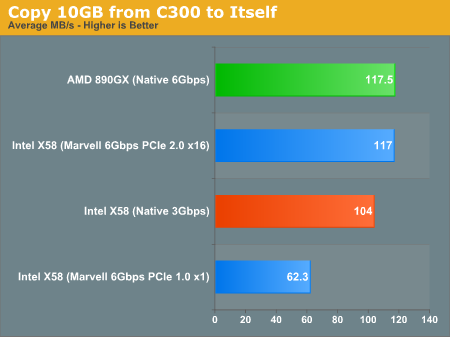6Gbps SATA Performance: AMD 890GX vs. Intel X58/P55
by Anand Lal Shimpi on March 25, 2010 12:00 AM EST- Posted in
- Storage
Write Performance Isn’t Safe Either
Testing read performance is the easiest since I just fill the SSD with data once and can read off it multiple times. To achieve repeatable write performance however I have to secure erase the drive between each test. Not impossible, but annoying given that only certain motherboards allow me to drop the SATA ports into legacy mode which is necessary for the DOS based secure erase application to work. For that reason I’m only providing a small subset of my testbeds here to prove that write speed is also impacted:

Here the results are even more frustrating. Paired with a PCIe 1.0 slot, random write speed is virtually cut in half. The frustration comes from the fact that Intel’s native 3Gbps controller is faster than almost anything else here.
I say almost because we do have one exception. AMD’s 890GX delivers a staggering 180MB/s in random write performance, a full 31% faster than Intel’s X58. The random write speed makes me believe that with a bit of driver and/or BIOS work we can get random read performance up there as well.
Performance in the Real World
These differences are visible in the real world as well. I took four systems and copied a 10GB file from the C300 to itself and measured average write speed:

The real takeaway here is that sticking a 6Gbps controller behind a PCIe 1.0 slot wreaks havoc on performance.










57 Comments
View All Comments
Ralos - Saturday, March 27, 2010 - link
Hi Anand,Using Firefox 3.6.2 with the security options activated, your site appears blocked for security reason. Untrustworthy. www.anandtech.com/storage specifically.
Thought you'd like to be informed of this misunderstanding.
StormyParis - Saturday, March 27, 2010 - link
what is the CPU usage ?psychobriggsy - Friday, March 26, 2010 - link
It would have been nice to see the Marvell speeds when attached by PCIe on the AMD board. Seems like an obvious thing to include to be honest.Impressive write speeds for the AMD controller, which gives a lot of hope that they can improve the read speeds, as they indicate they can with their in-house test bed.
AMD should bulk up their test bed with retail motherboards as well, so that they don't just test in ideal circumstances.
assassin37 - Friday, March 26, 2010 - link
Anand,Im torn,
I have the Gigabyte X58-ud3r system with I7, I also have the Gigabyte AMD 890GPA-UD3H with Phenom 965. Lastly I have a 256 crucial C300 and 2 vertex 120's,I have to return 1(mobo-cpu) setup to new egg soon, what would you do, sorry I know this is not a comment
TrackSmart - Friday, March 26, 2010 - link
I'm not Anand, so I can't say what he would do. But honestly, it's a matter of your personal preference and priorities.I like to support competition, so I put together an AMD Phenom II X4 system instead of an Intel Core i5 750 system. I chose AMD because they offered me similar performance per dollar (they were slightly cheaper but had slightly lower performance), plus I felt good about supporting much-needed competition in the CPU market.
What are YOUR priorities? Maximum performance? Supporting competition in the CPU/GPU market? Best performance per dollar? Most energy efficient?
That should be what makes your decision. The hardware you listed will all be blazingly fast, whatever you decide. The Intel platform offers potentially higher performance, but probably at slightly higher cost. Your choice. Same for the SSDs.
[sorry if that wasn't a "you should do this" kind of answer.]
wiak - Thursday, March 25, 2010 - link
what about Highpoint Marvell 6Gbps PCIe 2.0 card on AMD 7-Series chipset?for me that has no USB3 or SATA 6Gbps on my AMD 790FX motherboard
it will make this article fully complete, its the only thing thats missing! :)
georgekn3mp - Thursday, March 25, 2010 - link
About the two different Marvell controllers 88SE9123 and the 88SE9128...the older 9123 does NOT support RAID and the newer 9128 DOES natively support RAID 0, 1 and 5.Unfortunately on my Asus P6X58D, the controller is the older 9123 so the only way I could RAID a SATA-III SSD (or even mechanical) drive is using "Windows" Raid, not firmware on the controller. Whether it hurts performance though is harder to say since I can't test it yet ;).
I have been planning on the 256GB RealSSD for a couple of months now and am happy they started shipping...as one of the main reasons I had picked the Asus board was the native USB3 and SATA-III support. Unfortunately it does not support the RAID function but at almost 750 a drive I was not going to RAID for a while anyway....I AM happy I went with X58 for sure!
It seems the newer Gigabyte boards UD4 or higher do have the newer controller and are better for RAID SSD expecially now that it is hardware supported...the open question no one has been able to answer is if the Marvell 88SE9128 will pass TRIM commands to a RAID SSD set. So far Gigabyte boards are the only ones with that controller it appears...
Intel just updated their ICH10R chipset firmware to pass TRIM to SSDs in RAID...hopefully Marvell does too.
Since the disk speed is the bottleneck on my new computer, $750 is worth it just to prompt me to Crossfire my 5850 because the bottleneck shifted to graphics....especially with i7-920 OC to 4Ghz ;)
deviationer - Friday, March 26, 2010 - link
So the p6x58d does have the PLX chip?Mark McGann - Monday, May 10, 2010 - link
The p6x58D premium apparently does not according to this linkhttp://benchmarkreviews.com/index.php?option=com_c...
Don't know about the newer p6x58D-E
KaarlisK - Thursday, March 25, 2010 - link
Software RAID is definitely no slouch:http://kmwoley.com/blog/?p=429">http://kmwoley.com/blog/?p=429
But this comparison used a very old ICH.